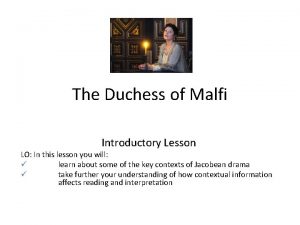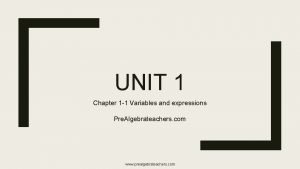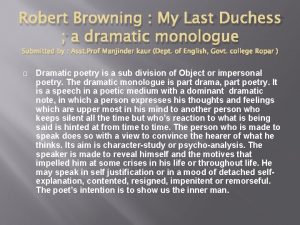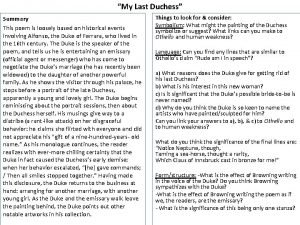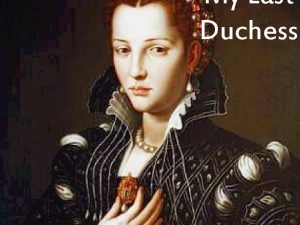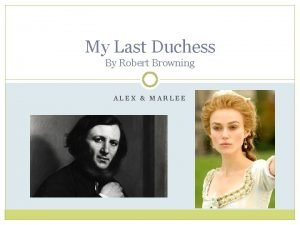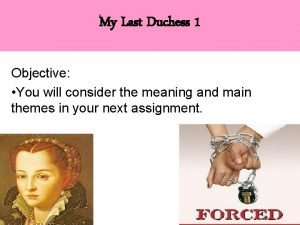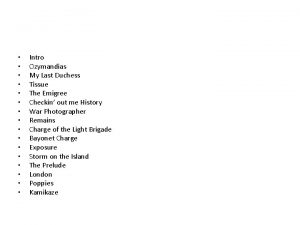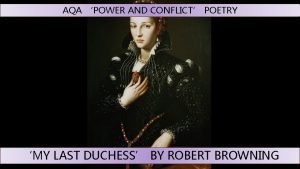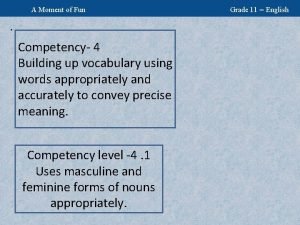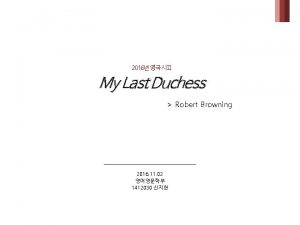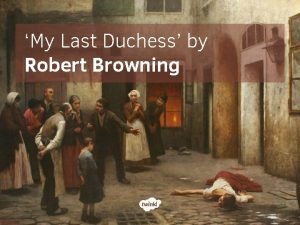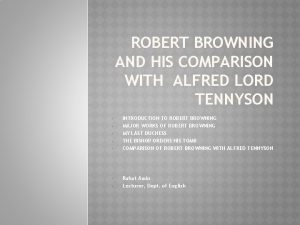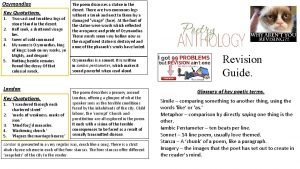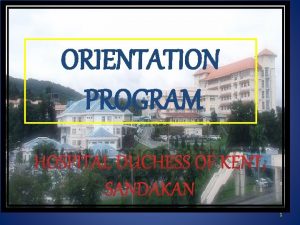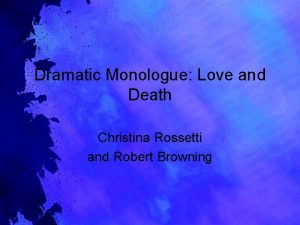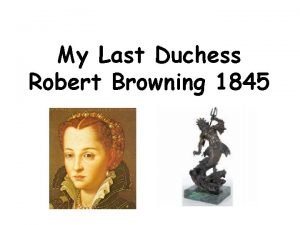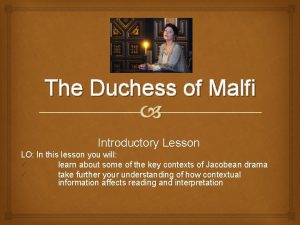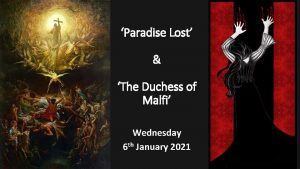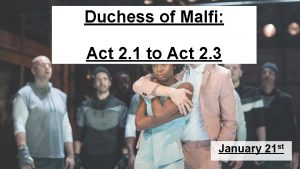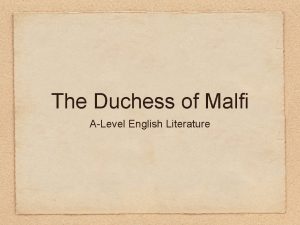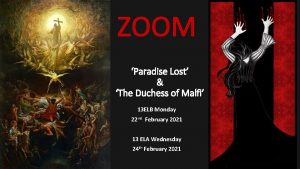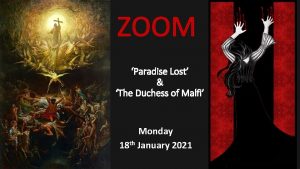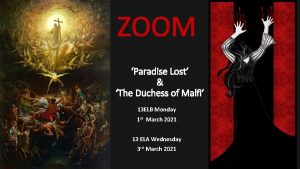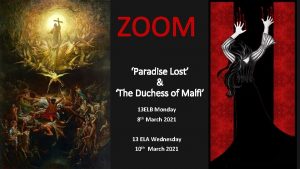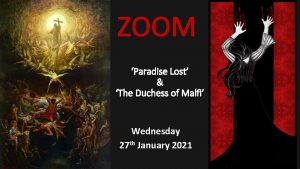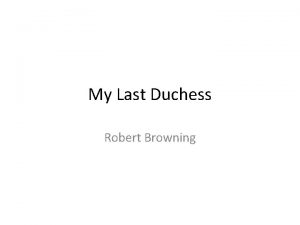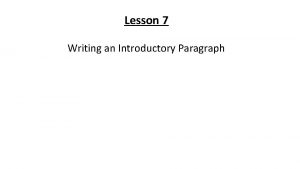The Duchess of Malfi Introductory Lesson LO In




























- Slides: 28

The Duchess of Malfi Introductory Lesson LO: In this lesson you will: ü learn about some of the key contexts of Jacobean drama ü take further your understanding of how contextual information affects reading and interpretation

The play in our world • The Duchess of Malfi is set in a world of political intrigue, religious intolerance, exile and search for asylum, imprisonment without trial, torture, murder and revenge. What connections could you make between those things in the play and in the world you live in?

Discuss • Can you think of other books/films or television programmes which deal with these themes?

What inspired the dramatists? • To understand the play is to understand the condition of England at the time. • England was quite unlike the myth of ‘Merrie England’ ruled over by ‘Good Queen Bess. ’ • Great poverty and great prosperity lived cheek by jowl in Shakespeare’s time. Wealth was unequally distributed leading to dangerous unrest. • To understand the contrast, read the extract from Richard II

This royal throne of kings, this scepter'd isle, This earth of majesty, this seat of Mars, This other Eden, demi-paradise, This fortress built by Nature for herself Against infection and the hand of war, This happy breed of men, this little world, This precious stone set in the silver sea, Which serves it in the office of a wall, Or as a moat defensive to a house, Against the envy of less happier lands, This blessed plot, this earth, this realm, this England, This nurse, this teeming womb of royal kings, Fear'd by their breed and famous by their birth, Renowned for their deeds as far from home, For Christian service and true chivalry, As is the sepulchre in stubborn Jewry, Of the world's ransom, blessed Mary's Son, This land of such dear souls, this dear land, Dear for her reputation through the world, Is now leased out, I die pronouncing it, Like to a tenement or pelting farm: England, bound in with the triumphant sea Whose rocky shore beats back the envious siege Of watery Neptune, is now bound in with shame, With inky blots and rotten parchment bonds: That England, that was wont to conquer others, Hath made a shameful conquest of itself. How far do you think Shakespeare is criticising the England of his time in this extract?

Social Hierarchy and the Malcontent • Elizabethan and Jacobean England was hierarchical. Monarch Aristocrats Knights During the reign of James I, the power of the monarchy and old aristocracy was increasingly challenged by the gentry and merchants angered by royal extravagance. No political parties. Instead there were factions held together by religious beliefs and a common interest in wealth and power Gentry Citizens Yeomen The majority of the population: no voice, no power, no wealth or possessions

Elizabethan & Jacobean England • Atmosphere of suspicion and fear. • Gossip and rumour flourished. • The government controlled news and debate – free discussion was distrusted by those in authority because it was thought to lead to treason. • Shakespearean and Jacobean tragedies invited audiences to witness the fall of great people. • Plenty of examples of social climbing e. g. Shakespeare himself. • The malcontent was a popular figure of the time – critical and rebellious.

A Modern Malcontent? Obviously I don’t vote as I believe democracy is a pointless spectacle where we choose between two indistinguishable political parties, neither of whom represent the people but the interests of the powerful business elites that run the world. Russell Brand.

Death disease and violence • Audiences were used to seeing shocking events and themes of tragedy. • Preoccupation with death and disease. • Average life expectancy was a little over 30. • High infant mortality (sometimes as high as 50% before the age of 15). • Sexual diseases were common. • The plague was a regular visitor and frequently caused the closure of theatres. • In London in 1603 over one sixth of the population died of the plague. • Few available anaesthetics, medical treatment was rudimentary. • Violence and crime were rife. • Public executions were watched by thousands.

Subordination of women • Men were firmly in control – patriarchal society. • Although Elizabeth I ruled for 40 years, she was an exception. Men ruled England. • James I hated women. • Women who spoke up were viewed with suspicion. • Women were considered a different species to men. • Women had little education. • Women were regarded as possessions. • Although men ruled, women’s influence was obvious in many spheres of life. • English women enjoyed more freedom than European women. • Drama presented many articulate and intelligent

The Jacobean Court • The English court was the seat of power. It was elitist and exclusive. • Dominated by a small number of aristocrats. • Atmosphere of ambition and intrigue and scheming for financial power. • James I’s court was particularly corrupt. • The court created vast debt. • Sexual corruption flourished.

Religion • Throughout the 16 th Century, England swung between Protestantism and Catholicism resulting in persecution of both. • Catholics were distrusted and feared because they were seen as superstitious and corrupt. • Despite differences, religion was at the heart of all. • Jacobean playwrights knew the Bible well and assumed most shared their knowledge. • But more and more, questions were being

Contempt foreigners It was a time of exploration and conquest. England’s empire had grown under Elizabeth I. England was secure in her own identity. Foreigners viewed as aliens: Jews, Turks, Indians or Africans are abused and insulted in drama of the time. • Italy and Spain were seen as corrupt. • •

London and Theatre • London was the most important city in England. • It was the capital, a thriving port and the financial centre of the country. • Brothels and taverns were popular. • Londoners enjoyed a rich variety of entertainment. • Theatres were becoming more respectable and enjoyed the patronage of aristocrats and wealthy citizens. • Theatres were still suspiciously regarded by the authorities because it exposed conflicts in society.

Everyday events & witchcraft • Drama was often based on real events in Spain or Italy. • Playwrights made use of real events e. g. Macbeth references the Gun Powder Plot of 1605. • Most people believed in witches and witchcraft, a regular theme in dramas of the time.

Discuss • The tragedies reflect the preoccupations of the Elizabethan and Jacobean age but also have universal appeal today. agree disagree

Homework • In preparation for our next lesson please visit my blog: Mrsjgibbs. wordpress. com • View and make notes on the BBC programme on Elizabethan and Jacobean Tragedy. Pay particular notice to what you learn about classical dramatists: Plautus and Seneca.

Jacobean Revenge Tragedy Lesson 1 LO: In this lesson you will: ü learn about some of the key contexts of Jacobean drama ü take further your understanding of how contextual information affects reading and interpretation

Feedback • Why was revenge such a popular theme in the Elizabethan and Jacobean dramas? • What were the popular crimes and ethical arguments played out? • Other than revenge, what other themes were popularly explored? • What is the relevance of Plautus and Seneca?

Revenge – good or bad? • An eye for an eye • Turn the other cheek In your own words, explain the meaning of these sayings and their differences. Discuss your views of revenge

The Origins of Tragedy • Has its origins in Greece. • Greek Philosopher Aristotle’s (384 -322 BC) assumptions about the nature of tragedy inspired Shakespeare, Webster and Middleton. He outlined his ideas about tragedy in The Poetics. His theories provided a model for Renaissance thinking about tragedy. • The Renaissance period is described as ‘neoclassical’ because it revived these classical ideas.

One swallow does not make a summer. Young people are in a condition like permanent intoxication, because youth is sweet and they are growing. It is the nature of desire not to be satisfied, and most men live only for the gratification of it. Aristotle Discuss what each of these means, explain them in your own words We are what we repeatedly do. It is possible to fail in many ways. . . while to succeed is possible only in one way. Evil draws men together.

Aristotle on tragedy • From the start, there are clues that all will not be well, and the atmosphere is one of doom from the beginning of scene 1. • The hero starts at a high position of happiness, prosperity and success. • The hero, due to some tragic flaw (e. g. hubris = too much pride) in his nature, makes a serious error in judgement - hamartia, which leads to a reversal of fortune – peripeteia leading to a fall in status and a moment of extreme suffering (pathos). • This results in anagnorisis, where the hero begins to understand to realise his mistakes. • There is a cleansing of the old order, and the hero dies and another prepares to take over.

What is Jacobean Tragedy? • Written during the reign of King James I (16031625). • Jacobus is Latin for James. • Jacobean tragedy is sometimes called ‘revenge tragedy’ or ‘the theatre of blood’. • Identifies a genre: plays which share certain Independent learning task: • Publication of The Duchess of distinctive features. Create a time line which shows: Malfi. • Death and reign of Queen Elizabeth 1 • Publication of Hamlet • Death and reign of King James • The births and deaths of Marlowe, Shakespeare, Webster, Middleton and John Ford.

The features of Jacobean Tragedy • Revenge- various quests for vengeance leading to violent deaths. Different attitudes to revenge are explored. Disguise and counter plots are common. • Brutal and wicked behaviour – murder, treachery, cruelty, sexual lust, desire for power. Appetites which lead to destruction. Atmosphere of moral decay. • The corrupt society of Renaissance Italy and Spain - usually set in a decadent and vice-ridden foreign court, full of self seekers and Machiavellian political intrigue. Popular prejudice of such foreign places. • Religious and moral hypocrisy –Priests and religious leaders insincere and deceitful. Usually anti-Catholic (Jacobean England was Protestant). • The malcontent – a troubled individual who comments critically on society and other characters. Often a revengeful plotter, agent of retribution. Based on John Marston’s play ‘The

Critical terminology • • • Jacobean Renaissance Malcontent Machiavellian Revenge tragedy Anagnorisis • • • Peripeteia Hubris Harmatia Catharsis Pathos Independent learning Task: Create a key of critical terms with their definition. To meet AO 1 you must use these terms critically and accurately.

Homework • Study the booklet you have been given ‘What a piece of work is man’. Make notes on the following contexts: – Plot and genre – Elizabethan character and personality types – The Renaissance – Contemporary performance – Language • Add critical terms to your key. • Familiarise yourself with the language of the

On-going learning task • As we read, it is worth noting to what extent TDOM meets the generic conventions of Aristotelian and Jacobean tragedy. • Complete the tables for each as we read and note any breaks with these conventions in the text.
 The duchess of malfi introduction
The duchess of malfi introduction 1-1 variables and expressions
1-1 variables and expressions Numerical
Numerical Dramatic monologue my last duchess
Dramatic monologue my last duchess My last duchess sparknotes
My last duchess sparknotes Who is the duke talking to in my last duchess
Who is the duke talking to in my last duchess My last duchess themes
My last duchess themes My last duchess message
My last duchess message Themes of my last duchess
Themes of my last duchess Ozymandias and london venn diagram
Ozymandias and london venn diagram What poems link to my last duchess
What poems link to my last duchess Duchess alice in wonderland
Duchess alice in wonderland Sow feminine
Sow feminine My last duchess 분석
My last duchess 분석 Dramatic irony in my last duchess
Dramatic irony in my last duchess My last duchess structure
My last duchess structure My last duchess critical appreciation
My last duchess critical appreciation Ozymandias key quotes gcse
Ozymandias key quotes gcse Carta organisasi hospital duchess of kent sandakan
Carta organisasi hospital duchess of kent sandakan Dramatic monologue songs
Dramatic monologue songs Quotes of control my last duchess
Quotes of control my last duchess My last duchess
My last duchess Duke of ferrara my last duchess
Duke of ferrara my last duchess Hát kết hợp bộ gõ cơ thể
Hát kết hợp bộ gõ cơ thể Ng-html
Ng-html Bổ thể
Bổ thể Tỉ lệ cơ thể trẻ em
Tỉ lệ cơ thể trẻ em Voi kéo gỗ như thế nào
Voi kéo gỗ như thế nào Tư thế worms-breton
Tư thế worms-breton
